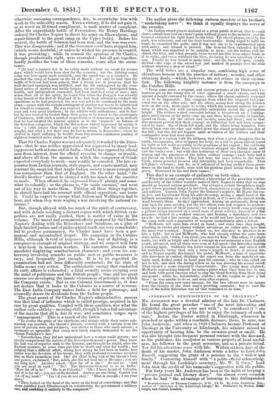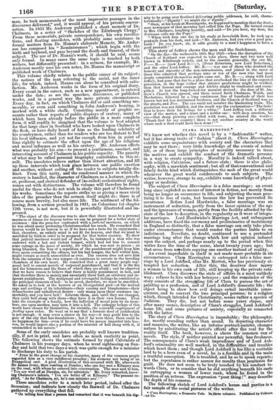ANDERSON'S REMINISCENCES OF DR. CIIALIIERS. * Ma. ANDERSON was a devoted
admirer of the late Dr. Chalmers. He found the great preacher " one of the most interesting and delightful characters he ever met with "; he considered it " one of the highest privileges of his life to enjoy the intimacy of such a man." Before the Doctor settled in Edinburgh, whenever he preached or spoke within a reachable distance, there, be sure, was John Anderson; and when in 1828 Chalmers became Professor of Theology in the University of Edinburgh, his admirer missed no opportunity of hearing him, be the occasion great or small. He was also brought into frequent personal contact with the deceased, as his publisher, his coadjutor in various projects of local useful- ness, his follower in the great secession, and as a private friend. Nor did his attentions cease with life. Within sixteen days of the death of his master, John Anderson wrote a letter to Lord John Russell, suggesting the grant of a pension to the " widow and family." Contenting himself with " a polite official acknowledg- ment through his Lordship's secretary, Mr. W. R. Grey," Lord John took the credit of his namesake's suggestion with the public). For forty years Mr. Anderson has been in the habit of keepinf a " private journal and literary diary." On almost every occasion when he had " the advantage of listening to this distinguished • Reminiscences of Thomas Chalmers, D.D., LL.D. By John Anderson, Esq., Author of " Sketches of the Edinburgh Clergy," &c. Published by Nichol, Edin- burgh, and Nisbet, London. man, he took memoranda of the most impressive passages in the discourses delivered," and, it would appear, of his private conver- sation. In 1832 Mr. Anderson published a short memoir of Dr. Chalmers, in a series of "Sketches of the Edinburgh Clergy." From these memorials, private correspondence, his own recollec- tions, and floating anecdotes, with probably some assistance in formal matters from Dr. Hanna's elaborate Memoir, Mr. Ander- son has composed his " Reminiscences " ; which begin with the birth and boyhood, and pass beyond the death and funeral, of their subject. The use of Dr. Hanna's work, it should be said, seems only formal. In many cases the same topic is touched by both writers, but differently. presented : in a sermon, for example, Mr. Anderson mostly uses his own notes, Dr. Hanna the manuscript or published work of Chalmers. This volume chiefly relates to the public career of its subject ; the notices of the man referring to the social, not the inner life; for which, indeed, Hanna can alone be consulted with satis- faction. Mr. Anderson works in the form of his original diary. Every event in the career, such as a new appointment, is entered under the date; so are the speeches, discourses, or published works, and in a general way the more private circumstances. Every day, in fact, on which Chalmers did or said something me- morable, or even said something in John Anderson's hearing, is marked with a white chalk. Consisting mainly of graphic ac- counts rather than reports of public displays of oratory, many of which have been already before the public in a more complete form, it will readily be imagined that the volume is best adapted for that large class in Scotland who have looked upon Chalmers in the flesh, or have daily heard of him as the leading celebrity of his countrymen, rather than for readers who are too distant to feel his local influence, and yet not fax enough from him in point of time rightly to estimate the effect upon the age of his religious and moral influence as well as his oratory. Mr. Anderson effects what was probably his aim—to present a continuous, succinct, and interesting account of Chalmers in his public capacity. The paucity of what may be called personal biography contributes to this re- sult. The anecdotes relieve rather than divert attention, and fill up those intervals which took place between one public exertion and another, without calling off the reader to subjects totally dis- tinct. From this unity, and the condensed manner in which the oratory is handled, the character of Chalmers as a lecturer, preach- er, professor, and clerical defender of (so-called) ecclesiastical rights, comes out with distinctness. The volume will therefore be found useful for those who do not wish to study this part of Chalmers in his works. Sometimes the reports strike us as giving a more vivid idea of the preacher than the sermon itself might do ; there is of course more -brevity, but also more life. The sentiment of the fol- lowing, from a sermon preached in 1821, on Colossians 1st chapter 12th verse, is not new, but it is powerfully illustrated and im- pressed. " The object of the discourse was to show that there must be a personal meetness or fitness for heaven before we can be prepared for a better state of existence : this the preacher contrasted with a judicial meetness, on which he was afraid many professing Christians relied too much. He remarked that heaven would be no heaven to us if we have not a taste for its enjoyments ; that, therefore, an unholy mind is not fit for heaven, and that we must be sanctified by faith in order to be prepared for that better country. To show that judicial meetness would not of itself do, he instanced a man who was endowed with a bad and violent temper, which had led him to commit some outrage on the peace of society, for which he was sent to prison; on being liberated, the fear of a repetition of the punishment might keep him from again committing the offence, but his bad temper, the hell within him, might remain as much unmortified as ever. The ransom does not save him from the miseries of his own temper—it continues to corrode in the brooding chambers of his own heart.. He remarked that a great many people sup- posed hell to consist merely of corporeal punishment, and that it is the fire and the brimstone and the flame of which they are afraid ; and he observed that we have reason to believe that there is bodily punishment in hell, and that therefore there is mainly and essentially there both an arbitrary and in- herent punishment. The malignant and revengeful feelings he considered as the principal elements of hell : to be saved, therefore, we must be sanctified. He asked us to look at the horrors of an ill-regulated gaol—at the mutual rage and revilings of its inhabitants—their cursing and blasphemies—their
debaucheries and unhallowed desires : only stamp upon these creatures im- mortality, and you have hell ! Liberate them, and until they are changed,
they carry hell along with them—they have it in their own bosoms. Even take the example of a family, how the infliction of moral pain by its mem- bers, one upon another, may turn it into a hell. The unhappy beings of this world have chosen for themselves, for eternity, the niiserable employment of leediny upon ashes. He went on to say that a forensic deed of justification Is not enough : it may cover a sinner on his way—it may guide him to the gate of the city that has foundations ; but if he were there, there could be no happiness for him—even if he could have his person imported into hea- ven, he would import also a portion of the miseries of hell along with it, if unsanctified in his nature."
Some of the early anecdotes are probably well known tradition- ally, if not in print, and have often as much rusticity as point. The following shows the estimate formed by rigid Calvinists of -Chalmers in his younger days, when he went sightseeing on Sun- -day and held that two days a week was quite enough for a minister to discharge his duty to his parish.
" Prior to the great change on his character, many of the common people regarded him as a very indifferent preacher; his sermons not being of an Evangelical cast. A good illustration of thin occurred with Mr. afterwards Sir James Ivory, then residing at Dundee; who one day met a Kilmany man on the road, with whom he entered into conversation. The man said to him, ' You are weel off at Dundee, sir, for ministers.' Mr. Ivory remarked, know- ing Chalmers's talents, You are better off at Kilmany. ' The peasant ' As for Chalmers, sir, he's sae minister ava'. "
These anecdotes refer to a much later period, indeed after the Secession; and indicate how closely the Boswell of Dr. Chalmers gathered up everything that fell.
" On telling him that a person bad remarked that it was beneath his dig-
nity to be going over Scotland delivering public addresses, he said, charac- teristically= Dignity ! we might die o' dignity !'
"Once, at his house at Morn ingside, we happened to mention that the Scots- man newspaper of that morning had called him the Pope. ...He turned round to Mrs. Chalmers, laughing heartily, and said—' Do you hear, my dear, the Scotsman calls me the rope ? '
" When with him one day in his study at Liverleith Row, be took up a penknife from his desk, and said—' Mr. Anderson, had you ever a good pen- knife ? Do you know, sir, it adds greatly to a man's happiness to have a good penknife!' "
This story of Jeffrey shows the man and the Scotchman.
"On the day—the memorable 18th May 1843—when the disruption of the Church of Scotland was expected to take place, there met two men well known in Edinburgh society, and to the country generally,' the one Mr. P— R— (now Lord It—), [Peter Robertson, now Lord Robertson,] and the other Lord Jeffrey. Mr. it— was one of those who doubted the honesty and sincerity of the non-intrusionista, and joined in the sneer of those who admitted that perhaps nine or ten of the men who had most deeply committed themselves might come out. Mr. It--, along with Lord Jeffrey, had gone that day to a place that overlooked the line of the expected procession, in the hope rather that sinister predictions might be verified, than that honour and courage and fidelity might be vindicated and exem- plified. At last the long-looked-for moment arrived : the door of St. An- drew's Church was opened, and there issued forth Chalmers, Welsh, and Macfarlane, followed by a long continuous line of hundreds of their less known but not less determined brethren, and the Church of. Scotland was on the streets, and Free. The eye could not number the blackening train. The prediction was not fulfilled, and the result was the exclamation—' The fools! thus to leave their fat livings for a whim!' Lord Jeffrey took a different view of the matter, and a truer and a nobler one : with deep emotion, his eye—that sharp piercing eye—filled with tears, he uttered the words- ' Thank God for my country! there is not another country in the world where such a deed could have been done!'"



























 Previous page
Previous page